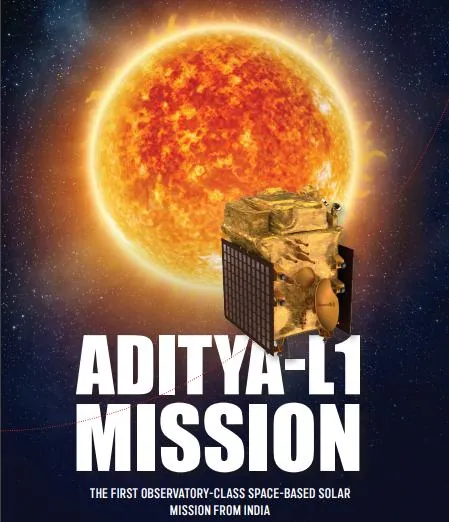Aditya-L1 Solar mission ISRO

About
Aditya-L1 Solar mission ISRO. Aditya L1 shall be the first space based Indian mission to study the Sun. The spacecraft shall be placed in a halo orbit around the Lagrange point 1 (L1) of the Sun-Earth system, which is about 1.5 million km from the Earth. A satellite placed in the halo orbit around the L1 point has the major advantage of continuously viewing the Sun without any occultation/eclipses. This will provide a greater advantage of observing the solar activities and its effect on space weather in real time.
The spacecraft carries seven payloads to observe the photosphere, chromosphere and the outermost layers of the Sun (the corona) using electromagnetic and particle and magnetic field detectors. Using the special vantage point L1, four payloads directly view the Sun and the remaining three payloads carry out in-situ studies of particles and fields at the Lagrange point L1, thus providing important scientific studies of the propagatory effect of solar dynamics in the interplanetary medium
The suits of Aditya L1 payloads are expected to provide most crucial informations to understand the problem of coronal heating, coronal mass ejection, pre-flare and flare activities and their characteristics, dynamics of space weather, propagation of particle and fields etc.
Science Objectives
The major science objectives of Aditya-L1 mission are:
Study of Solar upper atmospheric (chromosphere and corona) dynamics.
Study of chromospheric and coronal heating, physics of the partially ionized plasma, initiation of the coronal mass ejections, and flares
Observe the in-situ particle and plasma environment providing data for the study of particle dynamics from the Sun.
Physics of solar corona and its heating mechanism.
Diagnostics of the coronal and coronal loops plasma: Temperature, velocity and density.
Development, dynamics and origin of CMEs.
Identify the sequence of processes that occur at multiple layers (chromosphere, base and extended corona) which eventually leads to solar eruptive events.
Magnetic field topology and magnetic field measurements in the solar corona .
Drivers for space weather (origin, composition and dynamics of solar wind
The instruments of Aditya-L1 are tuned to observe the solar atmosphere mainly the chromosphere and corona. In-situ instruments will observe the local environment at L1. There are total seven payloads on-board with four of them carrying out remote sensing of the Sun and three of them carrying in-situ observation.
Payloads along with their major capability of scientific investigation.
The Sun
Our Sun is the nearest star and the largest object in the solar system. The estimated age of sun is about 4.5 billion years. It is a hot glowing ball of hydrogen and helium gases. The distance to the sun from the earth is about 150 million kilometres, and is the source of energy for our solar system. Without the solar energy the life on earth, as we know, can not exist. The gravity of the sun holds all the objects of the solar system together.
At the central region of the sun, known as ‘core’, the temperature can reach as high as 15 million degree Celsius. At this temperature, a process called nuclear fusion takes place in the core which powers the sun. The visible surface of the sun known as photosphere is relatively cool and has temperature of about 5,500°C.
Source ISRO Site
The launch

Aditya-L1: The launch is scheduled on September 2, 2023 at 11:50 am
Aditya-L1 Solar mission ISRO લોન્ચિંગ લાઈવ જોવો નીચેની સાઈટ દ્વારા
સૂર્ય યાન ઈસરોની વેબસાઇટ પર લાઈવ જોવા માટે અહીં ક્લિક કરો
સુર્ય યાન ઈસરોની યું ટ્યુબ ચેનલ પર લાઈવ જોવા માટે અહીં ક્લિક કરો
ઇસરોના ફેસબુક પેજ પર લાઈવ જોવા માટે અહીં ક્લિક કરો
| Official Site | https://www.isro.gov.in/index.html |
| Latest Upadte Home Page | Click Here |
| Join Whatsapp Group Link | CLICK HERE |
Important :- Please Confirm all the Information on Official Website / Notification / Advertisement. We have Provided Official Website / Notification / Advertisement’s Details Above.